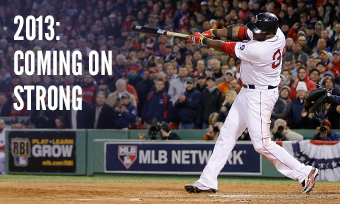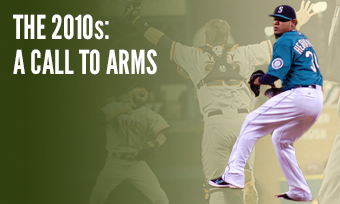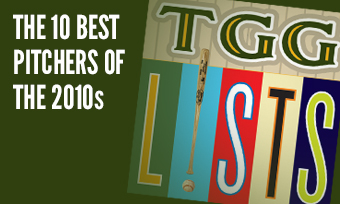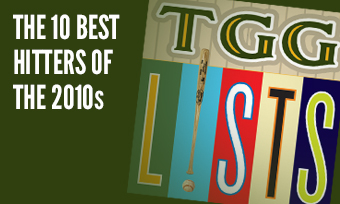The Yearly Reader
Leaders and Honors, 2013
Our list of baseball’s top 10 hitters and pitchers in both the American League and National League for the 2013 baseball season, as well as the awards and honors given to the game’s top achievers of the year.
The National League’s Top 10 Hitters, 2013
Bold type in brick red indicates league leader.
1. Paul Goldschmidt, Arizona
Key Numbers: .302 average, 103 runs, 182 hits, 36 doubles, 36 home runs, 125 RBIs, 99 walks, 19 intentional walks, 15 stolen bases, 25 grounded into double plays, .551 slugging percentage.
In only his second full season, Goldschmidt came thundering into his own in the Arizona desert—but likely missed out on the NL MVP as his Diamondbacks made little noise in the playoff chase.
2. Matt Carpenter, St. Louis
Key Numbers: .318 average, 126 runs, 199 hits, 55 doubles, 7 triples, 11 home runs, 78 RBIs, 78 walks.
The left-handed hitter lacking speed emerged as an unlikely leadoff catalyst for countless Cardinals rallies. Like most everyone else on the St. Louis roster, Carpenter thrived with runners in scoring position, batting .388 in 116 such at-bats.
3. Freddie Freeman, Atlanta
Key Numbers: .319 average, 89 runs, 176 hits, 27 doubles, 23 home runs, 109 RBIs.
The young first baseman continued to improve and hit MVP-level numbers, finishing fifth in the NL vote.
4. Andrew McCutchen, Pittsburgh
Key Numbers: .317 average, 97 runs, 185 hits, 38 doubles, 5 triples, 21 home runs, 84 RBIs, 27 stolen bases.
Some players get the MVP for helping their team into the postseason; McCutchen also got his for helping the Pirates break, at long last, a record drought of 20 straight years finishing below .500.
5. Jayson Werth, Washington
Key Numbers: 129 games, .318 average, 84 runs, 24 doubles, 25 home runs, 82 RBIs, 10 stolen bases.
Disappointing through the first two years of a sizeable contract, Werth finally gave the Nationals their money’s worth with a strong second half.
6. Joey Votto, Cincinnati
Key Numbers: 162 games, .305 average, 101 runs, 177 hits, 30 doubles, 24 home runs, 73 RBIs, 135 walks, 19 intentional walks, .435 on-base percentage.
Votto walked so often that he was criticized for not being more aggressive at the plate; his non-walk numbers suggested otherwise.
7. Troy Tulowitzki, Colorado
Key Numbers: 126 games, .312 average, 27 doubles, 25 home runs, 82 RBIs.
A broken rib in June was this year’s culprit keeping the All-Star shortstop from getting in a complete season.
8. Michael Cuddyer, Colorado
Key Numbers: 130 games, .331 average, 31 doubles, 20 home runs, 84 RBIs, 10 stolen bases.
On his way to the NL batting title, Cuddyer set a Rockies record with a 27-game hit streak; it might have been 33 games, but in between there was a hitless pinch-hit appearance in which he walked. (Nolan Arenado tipped Cuddyer’s team record by one in 2014.)
9. Shi-Soo Choo, Cincinnati
Key Numbers: .285 average, 107 runs, 34 doubles, 21 home runs, 54 RBIs, 112 walks, 26 hit-by-pitches, 20 stolen bases.
The 31-year-old Korean enjoyed a thoroughly productive one-year pit stop in Cincinnati in between long tenures at Cleveland and Texas, setting career bests in runs, walks and times getting hit.
10. Matt Holliday, St. Louis
Key Numbers: .300 average, 103 runs, 31 doubles, 22 home runs, 94 RBIs, 31 grounded into double plays.
Holliday hit a rousing .390 with runners in scoring position—but then again, it seemed that everyone else on the Cardinals did, too.
The American League’s Top 10 Hitters, 2013
1. Miguel Cabrera, Detroit
Key Numbers: .348 average, 103 runs, 193 hits, 26 doubles, 44 home runs, 137 RBIs, 90 walks, .442 on-base percentage, .636 slugging percentage.
Cabrera grabbed his second straight AL MVP despite numerous injuries capped by pesky groin pains.
2. Chris Davis, Baltimore
Key Numbers: .286 average, 103 runs, 42 doubles, 53 home runs, 138 RBIs, 199 strikeouts.
In a career bookmarked by stretches of awful, clueless hitting (or more aptly, repeated swinging and missing), Davis hit a central peak and nearly the MVP honor from Cabrera with a blazing start—tying the record for most home runs (37) before the All-Star break.
3. Mike Trout, Los Angeles of Anaheim
Key Numbers: .323 average, 109 runs, 190 hits, 39 doubles, 9 triples, 27 home runs, 97 RBIs, 110 walks, 33 stolen bases.
The laid-back superstar shredded any doubts of a sophomore jinx and remained the game’s most complete player; on May 21, he became the youngest player ever to hit for the cycle.
4. David Ortiz, Boston
Key Numbers: 137 games, .309 average, 84 runs, 38 doubles, 30 home runs, 103 RBIs, 27 intentional walks, 21 grounded into double plays.
Ortiz continued his late-career renaissance and cemented his stature as the Red Sox’ modern-day icon, profanely rallying the team and city when it needed a shoulder to lean on in the wake of the Boston Marathon bombings in April.
5. Robinson Cano, New York
Key Numbers: .314 average, 81 runs, 190 hits, 41 doubles, 27 home runs, 107 RBIs.
In his final years at New York, Cano remained a pleasant diversion for a Yankees team handicapped by injuries and the latest Alex Rodriguez steroid saga.
6. Edwin Encarnacion, Toronto
Key Numbers: .272 average, 90 runs, 29 doubles, 36 home runs, 104 RBIs, 82 walks, 20 grounded into double plays.
An agreeable encore to Encarnacion’s breakout feats of sluggery in 2012; he hit most of his home runs before the All-Star Break (25) and on the road (24).
7. Adrian Beltre, Texas
Key Numbers: .315 average, 88 runs, 199 hits, 32 doubles, 30 home runs, 92 RBIs.
Beltre’s league-leading hit total was padded considerably by a quartet of four-hit games in May—the most by a major leaguer in a calendar month since Jose Reyes in 2006.
8. Josh Donaldson, Oakland
Key Numbers: .301 average, 89 runs, 174 hits, 37 doubles, 24 home runs, 93 RBIs.
The A’s got a belatedly solid return on the 2008 trade in which they dumped established pitchers Rich Harden and Chad Gaudin for prospects like Donaldson, who hit top stride in 2013.
9. Brandon Moss, Oakland
Key Numbers: .256 average, 30 home runs, 87 RBIs.
The quiet slugger’s bat sang loud for the A’s, though he played his best ball away from the cool marine air of the Coliseum—with 20 of his 30 homers belted on the road.
10. Jose Bautista, Toronto
Key Numbers: 118 games, .259 average, 82 runs, 24 doubles, 28 home runs, 73 RBIs.
Hip issues sidelined Bautista for the balance of the year in late August, capping an inconsistent yet still potent campaign at the plate.
The National League’s Top 10 Pitchers, 2013
1. Clayton Kershaw, Los Angeles
Key Numbers: 1.83 ERA, 16 wins, 9 losses, 33 starts, 2 shutouts, 236 innings, 232 strikeouts, 12 wild pitches, 5 stolen bases allowed, 11 caught stealing/picked off, 20 grounded into double plays.
The lefty rightfully joined Sandy Koufax as the only two Dodgers with multiple Cy Young Awards.
2. Adam Wainwright, St. Louis
Key Numbers: 2.94 ERA, 19 wins, 9 losses, .679 win percentage, 34 starts, 5 complete games, 2 shutouts, 241.2 innings, 35 walks, 219 strikeouts, 32 grounded into grounded plays.
The tall Cardinals ace found himself back at peak form two years after missing the entire season for Tommy John surgery, pitching at his best (14-4, 2.25 ERA) when it didn’t involve an NL Central opponent.
3. Cliff Lee, Philadelphia
Key Numbers: 2.87 ERA, 14 wins, 8 losses, 31 starts, 222.2 innings, 32 walks, 222 strikeouts, 21 grounded into double plays.
One of the few star Phillies to survive a disappointing season intact without injury, Lee still managed a winning record despite getting a second straight year of tepid run support.
4. Craig Kimbrel, Atlanta
Key Numbers: 1.21 ERA, 4 wins, 3 losses, 50 saves, 4 blown saves, 68 appearances, 67 innings.
Reconfirming his status as the game’s best closer of the moment, Kimbrel hit 50 saves for the only time in his career and was the sole reason the Braves were able to run away from Washington for the NL East title.
5. Madison Bumgarner, San Francisco
Key Numbers: 2.77 ERA, 13 wins, 9 losses, 31 starts, 201.1 innings.
With Tim Lincecum’s fastball fast fading and Matt Cain clearly on the downside, the “Horse” continued to be Country Strong among the Giants’ Big Three of the few years before.
6. Matt Harvey, New York
Key Numbers: 2.27 ERA, 9 wins, 5 losses, 26 starts, 178.1 innings, 31 walks.
A magnificent Harvey balanced the good (starting nod for the NL All-Stars) with the bad (poor run support, late-season Tommy John surgery).
7. Jose Fernandez, Miami
Key Numbers: 2.19 ERA, 12 wins, 6 losses, 28 starts, 172.2 innings.
Fernandez, whose previous claim to fame was an accidental beaning of teammate (and star hitter) Giancarlo Stanton during a spring training scrimmage, got better with each start and headlined an impressive year for rookie pitching in the majors.
8. Jordan Zimmermann, Washington
Key Numbers: 3.25 ERA, 19 wins, 9 losses, .679 win percentage, 32 starts, 2 shutouts, 213.1 innings, 40 walks.
Unrelated to star teammate hitter Ryan Zimmerman, the Nationals’ star pitcher had the extra ‘n’ as in ‘nothing’—which was pretty much what opponents got off him all year. This was especially true at home, where he ran up a streak of 21 straight starts without a loss (winning 14).
9. Steve Cishek, Miami
Key Numbers: 2.33 ERA, 4 wins, 6 losses, 34 saves, 2 blown saves, 69 appearance, 69.2 innings.
After taking over as the closer in early June, the fourth-year reliever posted a 1.18 ERA and began a streak of 33 straight save opportunities converted.
10. Zack Greinke, Los Angeles
Key Numbers: 2.63 ERA, 15 wins, 4 losses, .789 win percentage, 28 starts, 177.2 innings.
Greinke’s first year at Dodger Stadium was well remembered for being the focal point of two brawls—one of which cost him a month when his collarbone was broken in a scrum with the Padres; he also proved he could play offense, hitting .338 with a pair of stolen bases.
The American League’s Top 10 Pitchers, 2013
1. Max Scherzer, Detroit
Key Numbers: 2.90 ERA, 21 wins, 3 losses, .875 win percentage, 32 starts, 214.1 innings, 240 strikeouts.
Scherzer made up for Justin Verlander’s drop-off from the top with a 19-1 start, something previously accomplished by only two other pitchers: Rube Marquard in 1912 and Roger Clemens in 2001.
2. Bartolo Colon, Oakland
Key Numbers: 2.65 ERA, 18 wins, 6 losses, .750 win percentage, 30 starts, 3 shutouts, 190.1 innings, 29 walks, 21 grounded into double plays.
A year after serving his Biogenesis-related suspension, Colon swam the fountain of youth at age 40 with no reported PED positives.
3. Hisashi Iwakuma, Seattle
Key Numbers: 2.66 ERA, 14 wins, 6 losses, .700 win percentage, 33 starts, 219.2 innings, 42 walks, 10 wild pitches.
In his first full year in America, the 32-year-old Iwakuma became the Mariners’ second greatest Japanese import after Ichiro Suzuki.
4. Joe Nathan, Texas
Key Numbers: 1.39 ERA, 6 wins, 2 losses, 43 saves, 3 blown saves, 67 appearances, 64.2 innings.
Nathan’s second (and last) year at Texas was arguably the best of his career; he turned down a $9 million option to return in 2014, moving on to Detroit.
5. Greg Holland, Kansas City
Key Numbers: 1.21 ERA, 2 wins, 1 loss, 47 saves, 3 blown saves, 68 appearances, 67 innings.
In his first full year as closer, Holland set a Royals record for saves and helped the team achieve its first winning record in 10 seasons.
6. Anibal Sanchez, Detroit
Key Numbers: 2.57 ERA, 14 wins, 8 losses, 29 starts, 182 innings, 25 stolen bases allowed, 3 caught stealing/picked off.
For the second time in three years, Sanchez lost out on his bid for a no-hitter in the ninth inning; this time around, it was Minnesota’s Joe Mauer who played the spoiler on May 24.
7. Mariano Rivera, New York
Key Numbers: 2.11 ERA, 6 wins, 2 losses, 44 saves, 7 blown saves, 64 appearances, 64 innings, 9 walks.
At age 43, the future Hall-of-Fame closer called it a career with a strong showing despite a shaky midsummer stretch of blown saves; he would be the last active player to wear #42.
8. Justin Masterson, Cleveland
Key Numbers: 3.45 ERA, 14 wins, 10 losses, 32 appearances, 29 starts, 3 shutouts, 193 innings, 17 hit-by-pitches.
After a subpar 2012, the 28-year-old Jamaica native returned to peak form with a career-high number of wins; it would have been even higher had he gotten decent support, with only 3.5 runs per start.
9. Glen Perkins, Minnesota
Key Numbers: 2.30 ERA, 2 wins, 0 losses, 36 saves, 4 losses, 61 appearances, 62.2 innings.
A failed starter four years earlier, Perkins grabbed a hold of the Twins’ closer spot vacated a couple of seasons earlier by Joe Nathan and began a three-year stretch saving at least 32 games per season.
10. David Price, Tampa Bay
Key Numbers: 3.33 ERA, 10 wins, 8 losses, 27 starts, 186.2 innings, 27 walks, 4 complete games, 15 caught stealing/picked off.
The Tampa Bay ace saw his win total cut in half from the year before, with only two victories in 12 home starts; one look at his other numbers and it’s hard to believe it was entirely his fault.









